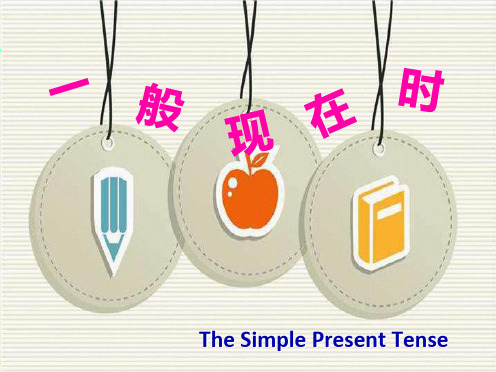小学一般现在时ppt
合集下载
小学英语一般现在时 第三人称单数 动词三单变化规则课件ppt

动词的三单变化
1、She studies English well. 2、Mike flies a kite. 3、Lucy play games every day. 4、The girl carries the box.
动词的三单变化 4、特殊变化
have — has go — goes do — does
单项选择
1.Ben_____a new bicycle. A.have B.has C.are D.were 2.Kitty_____her bicycle to the park. A.ride B.riding C.rides D.ridden 3.A man _____in front of his car. A.walk B.walks C.walking D.work 4.Sam’s bicycle ______a bell. A.have B has C.having D.is having 5.The girl _______ “Excuse me” A.say B.saying C.says D.sayes
单项选择
6.Mike______not like his bike. A.do B.is C.does D.are 7.He ______apples. A.likes B.like C.does D.are 8.He_______with his nose. A.smelling B.smells C.smell D.is smell 9.Lucy_______with her hands. A.touch B.touching C.touches D.touchs
studies finishes has lunch runs buys
综合练习
一般现在时ppt课件完整版

不可数名词作主语时,谓语动词用单数 形式。
可数名词单数作主语时,谓语动词也用 单数形式。
例如:Water is essential for life.(水 对生命至关重要。)/ A book is on the table.(一本书在桌子上。)
例外情况总结
当主语为并列主语时,谓语动词的数要与靠近它的主语保持一致。
练习3答案
reads。解析:主语 She 是第三人称单数 ,且时间状语为 on weekends,表示经 常性动作,所以谓语动词要用单数形式 reads。
THANKS
时间状语分类及举例
表示经常性或习惯性的动作
always, usually, often, sometimes
表示现在的状态或特征
now, at present, these days
表示普遍真理或客观事实
in general, as a rule
频率副词分类及举例
01
高频副词
always, constantly, continually
注意区分完全否定和部分否定。完全 否定表示全部否定,而部分否定表示 部分否定。例如,“None of the students passed the exam.”(没 有一个学生通过了考试)是完全否定 ;“Not all of the students passed the exam.”(并非所有学生都通过 了考试)是部分否定。
does he work?等。
动词短语和情态动词的变化规则
03
动词短语中的动词和情态动词后接动词原形,如I can swim,
they often go out等。
02 肯定句结构与用法
主语+动词原形+其他成分
一般现在时课件ppt(共25张PPT)

Jim
➢ Jim plays computer games every Sunday.
➢ He goes to school on foot everyday.
➢ He goes to school on foot everyday.
大家来找茬
He work very late every day. -Does you study English yourself?
She usually eats breakfast at 7:00.
play => plays
go => goes
• 以o, s, sh, ch, x结尾的动词,在词尾加es
She often goes to school at 8:00.
=> teach teaches I go to school every weekday.
She usually eats breakfast at 7:00.
He never eats breakfast.
She often goes to school at 8:00. I go to school every weekday.
My piano is quite new.
The earth moves
box => boxes
fly => flies
• 以辅音字母加y结尾的动词,要先将y变成i,再加 es
*26个字母中除AEIOU五个元音字母外,其余皆为辅音字母
study => studis
guesses
finishes
carries
snows
stops
sees
drives
28小学英语语法:小学英语八大时态复习(100张幻灯片)

carryies do es wash es visit s exercise s enjoy s jump s hhaavse
一般现在时否定式
be + not don’t do / doesn’t do
II 一般现在时的否定式
1.Be 动词的否定式: be + not
I am a teacher.
Exercise: 1. —What are you going to do this
afternoon? —I am going to the cinema with some
I often go there. You like the music. He goes to work by bus . We /You/They like it.
Do you often go there ? Do you like the music.? Does he go to work by bus ? Do you/they like it?
把句子中的动词改为过去式形式。通常有 五种写法。
动词过去式的写法:
一般情况,
I work in this city.
在动词末尾
I worked in this city last year. 加ed
They live in Shanghai . They lived in Shanghai last year.
先变y 为i,再加es
·特殊 have-has 等
写出下列动词的第三人称单数形式
help s guess es flyies makes leaves fix es swim s know s
play s
closes
一般现在时全讲PPT课件 小学英语 初一英语

every day every week every month
every year every morning /afternoon /evening
Every
day week month year morning afternoon早上 每天
每月 每天下午
回答:Yes, he is. No, he isn't.
Be提前,小变大,句变问,有 我就变你。 你问我答。
【一般现在时构成】
Do 型句
e.g. These boys like playing football. Lucy reads English every day.
动词是实义动词 构成: 主语+ 实义动词+ 其他
【一般现在时构成】
Do 型句
e.g. These boys like playing football. Lucy reads English every day.
当主语是第三人称单数的时候, 动词就要变成对应的第三人称单数。
人称与实义动词形式变化
当主语是第三人称单数的时候, 动词就要变成对应的第三人称单数。
快来总结定义啦! !
表 示 人 或 物 _ 习 __惯__性__,经___常__性___的动 作
表示人或物__现__在_____的状态 表示客观_事实 _或普遍_真___理___
一般现在时的“标志词”
大家好 , 我是Every俱乐部的 会长 ,右面都是我们的成员 。 我们和“一般现在时”认识好久 了 ,我们一直形影不离。
never
usually sometimes hardly
频率家族七兄弟
always usually often sometimes rarely hardly never
人教版(PEP)小学英语五年级上册期末复习课件ppt---一般现在时(共42张PPT)

重点
有be用___b__e___,有情用 __情_____,无be无情请求 __助________ (___d__o___、 __d__o_e_s__) 。
时态句式
肯定句
否定句 疑问句
not “不”
一般疑问句 特殊疑问句
Yes,… No,…
特殊疑问词提问 What,Where…
Bonus time
放在be动词的__后_面___
notes
常见结构
I like sleeping very much. 1. 非第三人称单数主语+__V_原____
注意:常见的非第三人称单数主语有:
__I____,__w_e___,_y__o_u__,_t_h_e_y__, my friends,the farmers…
Make sentence
they usually
the students every day
常见结构
He makes a card after class. 2. 第三人称单数主语+_V__-_s_/_V_-__e_s (动词
_第__三__人___称__单__数______形式)
注意:常见的第三人称单数主语有:
无be无情请求助(do, does)
He reads books every day. 否定句:He __d_o_e_sn_’_t __r_e_a_d__ books every day. 一般疑问句: __D_o_e_s ___h_e_ _r_e_a_d__ books every day? 肯否回答: Yes, he does./ No, he doesn’t. 特殊疑问句: ____W__h_a_t ___d_oe_s___he _d_o___ every day?
《小学一般现在时》课件

语连用
的选择
昨天我去图书馆借书。
我每天晚上看电视。
3 3.注意第三人称单数的变化
S he loves to sing .
4 搜索
一般现在时注意事项
八、练习题及答案分析
1 练习题
2 答案分析
1. 他们通常________(吃)晚 饭。
1. eat 2. do 3. W hat
2. W here ________ (do) you live?
3. ________ (what) tim e do you usually g o to bed?
3 搜索
一般现在时练习题及答案
四、表示经常性的副词
1 示例
always, often, usually
2 搜索
表示经常的副词
五、第三人称单数
1 变化规则
动词原形 + s/es
2 示例
H e runs fast.
3 搜索
第三人称单数的变化规则
六、一般现在时的用法
1 1.表示客观事实
水沸腾时产生蒸汽。
2 2.表示习惯或经常动作 3 3.表示现阶段的情况或
《小学一般现在时》PPT 课件
欢迎来到《小学一般现在时》PPT课件!在本课程中,我们将学习什么是一般 现在时以及它的句型和用法。
一、什么是一般现在时
1 定义
一般现在时用于描述客观事实、习惯性动作和现阶段的情况或状态。
2 示例
他们住在一个漂亮的城市里。
3 搜索
一般现在1 .肯定句结构
主语 + 动词
2 .否定句结构
主语 + do/does + not + 动词
3 .一般疑问句 结构
小学英语时态-PPT

一般现在时
(2) 当句子中即没有be动词,也没有情态动词时 ①陈述句:We get up at 7:00 every morning. 疑问句→Do you get up at 7:00 every morning? 否定句→We don’t get up at 7:00 every morning. ②陈述句:She has a little brother. 疑问句→ Does she have a little brother? 否定句→ She doesn’t have a little brother.
现在进行时
1. The boy is playing basketball. 否定句:____________________________ 一般疑问句:_________________________ 肯定回答:__________________________ 否定回答:__________________________
12. We _________ (not watch) TV on Monday.
13. Nick_______ (not go) to the zoo on Sunday.
14. They _________ (like) the World Cup?
按要求完成句子
1.Do you often play football after school? (肯 定回答) 2. I have many books. (改为否定句) 3. Gao Shan’s sister likes playing table tennis (改为否定句) 4. She lives in a small town near New York. (改为一般疑问句) 5. I watch TV every day. (改为一般疑问句) 6. David has got a goal. (改为一般疑问句)
- 1、下载文档前请自行甄别文档内容的完整性,平台不提供额外的编辑、内容补充、找答案等附加服务。
- 2、"仅部分预览"的文档,不可在线预览部分如存在完整性等问题,可反馈申请退款(可完整预览的文档不适用该条件!)。
- 3、如文档侵犯您的权益,请联系客服反馈,我们会尽快为您处理(人工客服工作时间:9:00-18:30)。
C. 一般疑问句: Do/Does+主语+动词原形+其他? I want to eat some bread. Do you want to eat any bread? Kate likes singing every morning. Does Kate like singing every morning? Lily often writes to her uncle in Canada. Does Lily often write to her uncle in Canada?
seldom (不常), never(从不)。
频率副词在句中的位置: 1. 频率副词用在be动词后。 It is usually hot in summer. 2. 频率副词用在实义动词前。 My 频率副词用在助动词与实义动词之间。 I will always love you.
不规则变化
have—has be--is
Practice one
写出下列单词的第三人称单数形式 lives live------ _________ discuss--- discusses _______ hurries takes hurry--- ________ take--- ________ goes wash--- ________ washes go---- ________ stays is stay-------- _________ be---________ enjoys collects enjoy------ _________ collect---- _______
They, twice a week
We ,study, every morning
I __________ usually eat hamburgers. They watch TV twice a week. ___________________ We study English every morning. ___________________
请根据以下信息描述 Jim 的一天 A day of Jim
Jim 5:00 5:30 a bus driver get up go to work, check the bus, have breakfast 6:00a.m.---2p.m. work 3p.m. have lunch, In the afternoon watch TV, go swimming
4.主将从现: 在时间状语从句和条件状语从句中,如果 主句是一般将来时,从句用一般现在时替 代一般将来时。 When I grow up, I’ll be a nurse. If it is fine tomorrow, we will have a picnic.
Brainstorming
I,usually,eat
二、汉译英。
1 他从周一到周五上学。
He goes to school from Monday to Friday. 2 每周五下午,他们去游泳。 They go swimming on Friday afternoon. 3.你是做什么的? What are you?/What is your job?/What do you do? 4 小明从来不说谎。 Xiao Ming never tells a lie. 5.薇薇喜欢音乐并且每天都听音乐。 Vivi likes music and listens to music every day.
B. 否定句:主语+don’t/ doesn’t+ 动词原形+其他。 I study English every morning. I don’t study English every morning. We speak Chinese. We don’t speak Chinese. Jim likes playing football. Jim doesn’t like playing football.
e.g. I usually go to school at 6:30. He attends meetings on Mondays.
频率副词
频率副词是表示与次数, 频率有关的副 词, 其排列是(由大到小):
always (总是), usually (经常),
often (常常), sometimes (有时),
Where does Kate come from?
Individual activity
课堂练习
• • • • • • •
• • • •
一.用所给动词的适当形式填空。 1. My classmate (know) the man on the bike . 2. His sister usually (go) to school at 7:00 am . 3. Lin Tao (like) his new sweater . 4. Let’s (play) tennis ! 5. What ___(do) he usually ___(do) after school? 6. How many lessons ___ your classmates ___(have) on Monday? 7. His father can ______ (ride) a bike. 8. Lily often ______ (have) lunch at school. 9. There ___ (be) some bread on the table. 10.___ you ___ (brush) your teeth every morning?
频率副词位置记忆口诀: Be后 实动前 助实间 How often 是对表示频度副词
的时间状语的提问,可翻译为
“多久(一次)”。
He often gets up at 6:00 in the morning. 1.人称代词he, she, it用第三人称单数 Peter listens to the radio at 7.a.m. 2.单个人名、地名或称呼作主语用第三人称单数。 This/That book is yours. A horse is a useful animal. 3. 单数可数名词或“this/that/the/a + 可数名词单数”作主语时,用第 三人称单数。 Everyone is here./This is a pen. 4. 不定代词someone, somebody, nobody等及指示代词this,that作 主语时,用第三人称单数。 The milk is in the glass. 5.不可数名词作主语时,看作第三人称单数。 “19” is a lucky number./ “I” is a letter. 6.当数字或字母作主语时,看作第三人称单数。
The Simple Present Tense
一般现在时
The earth goes I go to school around the sun. every day.
She is a policewoman.
一、一般现在时的定义:
1.客观真理或不 2.经常、反复发生 可变更的事实 的动作
3.存在的状态
三、第三人称单数动词变化规则
以 s, o, x, ch, sh 结尾的单词 +s +es like—likes get--gets go—goes watch--watches study—studies fly--flies play—plays stay--stays
以辅音字母加y 变y为i加 es 结尾的单词 以元音字母加y +s 结尾的单词
Practice two
用动词的适当形式填空 writes (write) computer games. Her Wendy ______ work parents and brother ______( work ) in her takes (take) her to business. Wendy’s driver______ school every morning. Sometimes she makes ______(make) phone calls to other people on does the way to school. She _____(do) her homework before dinner. Her family members _________(discuss) business at dinner. She discuss _____(go) to bed at 2 a.m. goes
二、一般现在时的构成
系动词be的一般现在时 实义(行为)动词的一 般现在时
含有be动词的一般现在时
• 句型结构: 肯定句:主语 + be + 表语 否定句:主语 + be + not + 表语 一般疑问句:Be + 主语 + 表语 特殊疑问句:特殊疑问词 + be + 主语+表语
• A. 肯定句: • 主语(I/We/You/They)+动词原形+其他 • 主语(He/She/It)+动词的s形式+其他 We often play basketball in the playground. Mary studies English, Chinese at school.
二、一般现在时的标志词(时间状语)
1.频度副词:always, usually, often, sometimes, seldom, hardly, never 2. 副词短语:once a week, every day, every month, on Sundays… 3.具体时间:at 6:00 every morning.
